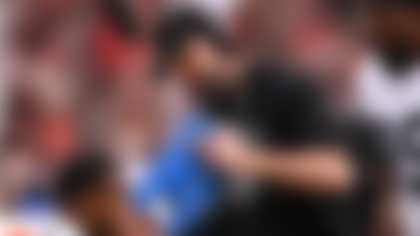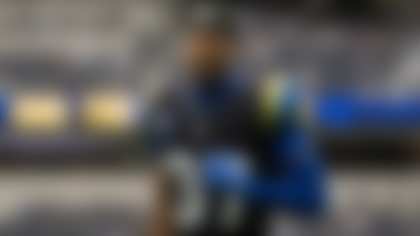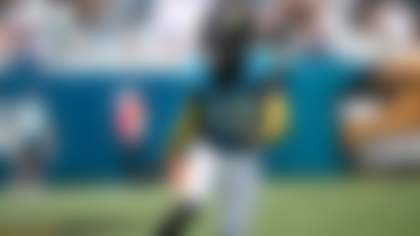Matt Hasselbeck is a three-time Pro Bowl quarterback who is entering his 15th season in the NFL. He is best known for leading the Seattle Seahawks to their only Super Bowl appearance during the 2005 season. He opened his first training camp with his fourth team, the Indianapolis Colts, on Wednesday.
In recent years, Hasselbeck has become involved helping people with traumatic head injuries, including visits with recovering soldiers at Fort Campbell. Earlier this week, Hasselbeck talked with NFL Evolution contributing editor Bill Bradley about his endorsement of Reebok's newest head injury device, the MC10 CheckLight skullcap.
Your work with the CheckLight skullcap seemed to start right before the Super Bowl in February when you were promoting it on Radio Row. How did you get involved with the MC10?
I was asked to be on the sports advisory committee by a former teammate of mine (Isaiah Kacyvenski) in Seattle. He had an impressive list of people already advising with him, guys like Grant Hill and Matt Birk and other select people in lacrosse and hockey. They had a ton of Olympians. ... That was impressive to me. I learned a little bit about the company. They were very qualified in the electronics field. Really, where they were looking for help was in the expertise from football and athletes and sports. I didn't know too much about them, but then as I got involved, and I heard about the different products they were launching -- whether it was hydration or UV monitors or this head-impact indicator -- I really came to become passionate about some of the stuff that they were doing.
What was it that impressed you about the MC10 CheckLight cap?
What's great about this product in particular is that it takes reporting of a head injury out of the hands of an athlete. It shines a light on it for everybody. Literally, a really bright LED flashing light will go off on the back of the skullcap where every player, referee, parent or coach will see that this person sustained a severe impact to the head and they should be checked out. They should be probably taken to the sidelines to see if they know what day it is, if they know the score of the game, if they remember their middle name. Unfortunately, now that's not what happens. People are able to hide head injuries. The answer (team officials) give is "Oh, no one knew. He never told us. She never said anything." This skullcap takes it out of the hands of the athletes and puts burden on everyone else that doesn't have a head injury. It seems like a pretty smart idea to me.
In your career, how many concussions do you think you have sustained?
I don't really know the answer to that. I've just had one surgery and that was on my left shoulder in 2006. In terms of my head, I know that I have had three concussions that have kept me out of a game. I have missed one game three times over the course of my NFL career. I think I've been really fortunate that way. But even with that, I know that had I not been honest about my symptoms, or someone had not cared enough to handle me properly, I would not have missed those games. I would have gone back in those games. A lot of times, those concussions I got, I did go back in the game. I took the hit, I got concussed, and then I would go back in the game for the next series or I would stay in for the next play and it wasn't until maybe a quarter later when I couldn't help the team anymore that I would come out. That's really one of the most dangerous things, not the first concussion but the second concussion while you've already having an impact injury. That's enough of a reason to look at this device. It gives you feedback in real time. It would say if you should be taken out of the game. And if you're fine, you're fine. It doesn't determine if you've had a concussion. It just determines if you should be evaluated.
What is it like to be on the other side, seeing guys suffering from a concussion?
The bigger issue last year was we had situations where guys would get concussions and you wouldn't know right away. There was a guy who didn't know until Monday. There was a guy who had one on the first play of the game and no one knew until the flight home. We told him, "You had a tough game, you had a bad game," and he's like, "Who did?" "You did" ... Then you start asking him questions, and the only play he remembers really is the first play of the game. You show him the video, and he says, "Oh, wow ... maybe ... wow." That's in the NFL where you've got high-def cameras, coaches and trainers and doctors and teammates, and everyone is educated. I can't imagine how much more difficult it is at the high school level and the youth level and really any level. It's a tricky issue. It's not super easy. The more that we can do by inviting technology to the party is a good idea.
Nobody wants to see a concussion happen, but have you seen how the CheckLight works in person?
Yes I have. ... It just launched the first week of July on Reebok.com and Dick's Sporting Goods and places like that. I haven't seen it in competition, but that's only because it's not football season. I know it's been tested and it's had 3 1/2 years in the making. I know it's been tested every which way.
Do you plan on trying to convince the NFL to allow teams to try out this skullcap?
That's something that would be great. But I don't feel like the need is as strong at the NFL because you have so many people looking and watching and observing. The issue really in the NFL becomes such a business about licensing issues and who makes that and who has that logo. It happens in footwear. I've worn Reebok shoes all my life. I worked in the warehouse there as a kid. Now Reebok out of that (NFL) deal, I'm not sure what I'm going to wear this year. But I've got kids who are playing football this year where it's not a business. The only business I worry about with them is keeping them as safe as possible.
How much does the CheckLight cost?
It's not an expensive item. It sells for $150. But it's not cheap, either. But then again in terms of what it does, it's probably worth every penny. As a parent, you're budgeting for the sign-up of Pop Warner Football or whatever your kid is going to play -- you're going to get the shoes, you're going to get the gloves. You're trying to educate and change a culture and create awareness all at the same time. That isn't easy. I remember a time when I was playing (youth football), coaches were yelling, "Aw, you don't need a water break." Now, 20 years later, science how shown us that it's so much harder to stay hydrated if you're playing football. It's not a sign of weakness; it's a better way to train. We'll probably look back 20 years from and say, "Oh my gosh, can you believe we used to do it that way?"
What do you say to a parent to convince them to buy the CheckLight system for their kid?
I've talked to a lot of parents about it, and most of them are my friends. One thing I say is that you can't see every play. Even though there's a coach out there, they're not watching your kid every single play. The MC10 is an extra set of eyes for you on your child. I have three kids, so I can't be watching them all, not all at once on three different fields or three different courts. The cool thing about this is that it doesn't have to be for football; it doesn't have to be for lacrosse. It doesn't have to be for a sport with a helmet. It can be for soccer or any sport that there's the potential for a head impact.



